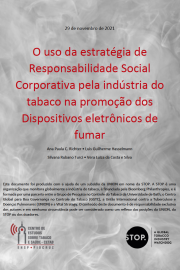
Mudanças referentes à interferência de setores interessados e o papel do Estado na economia e na sociedade são um fenômeno que vem acontecendo mundialmente nas últimas décadas, e que tem, consequentemente, gerado discussões a respeito do papel de organizações privadas em questões de saúde pública (Serpa & Fourneau, 2007). Um número crescente de empresas, em todo mundo, vem se esforçando para incorporar a responsabilidade social corporativa (RSC) como parte integral de seus negócios. Atualmente não existe consenso da definição do termo RSC, entretanto autores como Harjoto & Jo (2011) e Cai e colegas (2011) sugerem que as definições de RSC se referem aos esforços das empresas para servir a sociedade e meio ambiente além do que lhes é legalmente exigido.
RICHTER, Ana Paula; HASSELMANN, Luis Guilherme Hasselmann; TORRES, Raquel; TURCI, Silvana Rubano; SILVA, Vera Luiza da Costa e.O uso da estratégia de Responsabilidade Social Corporativa (RSC) pela indústria do tabaco na promoção dos Dispositivos eletrônicos de fumar (DEFs) [projeto STOP]. Centro de Estudos sobre Tabaco e Saúde (Cetab), Rio de Janeiro, 23 mai. 2022. 61p.
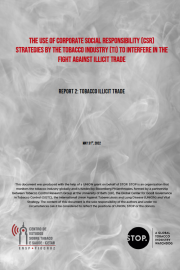
The illicit trade in tobacco products represents a major global concern for public health, economy and public safety. More specifically, the illicit trade in tobacco products undermines tobacco control policy efforts, particularly in relation to tax policy. As they are not taxed or regulated, illicit tobacco products do not have health warnings or packaging or labeling requirements, which favors their consumption. As with other regions in the world, the illegal cigarette trade in Mercosur involves lower average prices compared to taxed cigarettes. Furthermore, the increase in the accessibility of cigarettes, via the informal market, combined with the lower prices of smuggled products - and therefore not subject to regulation - favors the consumption of cigarettes by young people and low-income populations 1,4.
HASSELMANN, Luis Guilherme Hasselmann; RICHTER, Ana Paula Cardoso; TURCI, Silvana Rubano; SILVA, Vera Luiza da Costa. Uso pela indústria do tabaco (IT) de estratégias de Responsabilidade Social Corporativa (RSC) para interferir no combate ao comércio ilícito [projeto STOP]. Centro de Estudos sobre Tabaco e Saúde (Cetab), Rio de Janeiro, 23 mai. 2022. 49p.
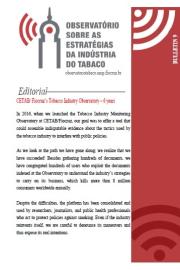
Bulletin nine published by the Center for Studies on Tobacco and Health of the Sergio Arouca National School of Public Health of the Oswaldo Cruz Foundation (Cetab/Ensp/Fiocruz). This edition consists of an editorial signed by Silvana Rubano Barretto Turci; Opinion: Who is interested in the transfer of Sister Lourdes Dill?; Electronic smoking devices (DEFs); Eduardo Leite: conflicting relations with the tobacco industry x Public Health and the radar column with the following headlines: book “Fight against tobacco in Brazil: 40 years of history” and Fiocruz Campaign promotes petition against the permission of cigarettes electronics in Brazil.
SIX years of CETAB/Fiocruz Tobacco Industry Monitoring Observatory [bulletin NINE]. Cetab/Ensp/Fiocruz, Rio de Janeiro, n. 9, 13 Apr. 2022.
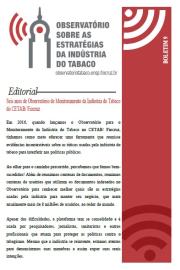
Boletim nove publicado pelo Centro de Estudos sobre Tabaco e Saúde da Escola Nacional de Saúde Pública Sergio Arouca da Fundação Oswaldo Cruz (Cetab/Ensp/Fiocruz). Esta edição é composta por um editorial assinado por Silvana Rubano Barretto Turci; Opinião: A quem interessa a transferência da Irmã Lourdes Dill?; Dispositivos eletrônicos para fumar (DEFs); Eduardo Leite: relações conflituosas com a indústria do tabaco x Saúde Pública e a coluna radar com as seguintes chamadas: livro “Luta contra o tabaco no Brasil: 40 anos de história” e a Campanha da Fiocruz promove abaixo-assinado contra a permissão de cigarros eletrônicos no Brasil.
SEIS anos de Observatório de Monitoramento da Indústria do Tabaco do CETAB/ Fiocruz [boletim NOVE]. Cetab/Ensp/Fiocruz, Rio de Janeiro, n. 9, 13 abr. 2022.

O Centro de Estudos sobre Tabaco e Saúde da Escola Nacional de Saúde Pública Sérgio Arouca (ENSP/Fiocruz) lançou, nesta segunda-feira (11), uma campanha para alertar sobre os riscos do uso e da possível liberação dos dispositivos eletrônicos para fumar (DEFs) no Brasil. Além de materiais informativos, com foco nas redes sociais, a campanha promove, ainda, um abaixo-assinado online para que a população se manifeste contra a autorização dos cigarros eletrônicos no mercado nacional pela Agência Nacional de Vigilância Sanitária (Anvisa). O abaixo-assinado pode ser acessado no link linktr.ee/cetab_fiocruz.
CAMPANHA da Fiocruz promove abaixo-assinado contra a permissão de cigarros eletrônicos no Brasil. Cetab/Ensp/Fiocruz, Rio de Janeiro, 23 mai. 2022. Disponível em: linktr.ee/cetab_fiocruz. Acesso em: 25 mai. 2022.
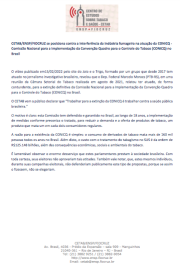
O vídeo publicado em15/02/2022 pelo site do Joio e o Trigo, formado por um grupo que desde 2017 tem atuado no jornalismo investigativo brasileiro, revelou que o Dep. Federal Marcelo Moraes (PTB-RS), em uma reunião da Câmara Setorial do Tabaco realizada em agosto de 2021, relatou ter atuado, de forma contundente, para a extinção definitiva da Comissão Nacional para a Implementação da Convenção Quadro para o Controle do Tabaco (CONICQ) no Brasil.
CETAB/ENSP/FIOCRUZ se posiciona contra a interferência da indústria fumageira na atuação da CONICQ - Comissão Nacional para a Implementação da Convenção Quadro para o Controle do Tabaco (CONICQ) no Brasil. Rio de Janeiro, 15 fev. 2022.
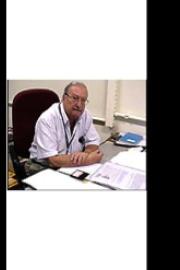
CETAB/Fiocruz homenageia Dr.Mirra, grande médico que trabalhou incansavelmente para o controle do tabagismo. CETAB, Rio de Janeiro, 28 jan 2022.
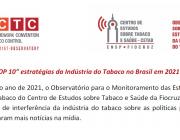
Para encerrar o ano de 2021, o Observatório para o Monitoramento das Estratégias da Indústria do Tabaco do Centro de Estudos sobre Tabaco e Saúde da Fiocruz selecionou 10 estratégias de interferência da indústria do tabaco sobre as políticas publicas no Brasil que geraram mais notícias na mídia. Da mesma forma, elencamos as “TOP 10” iniciativas promovidas pelos profissionais envolvidos no controle do tabagismo para expor a agenda da indústria do tabaco e a relevância do cumprimento do artigo 5.3 .
TOP 10 estratégias da Indústria do Tabaco no Brasil em 2021 / TOP 10 iniciativas para promover o controle do tabaco no Brasil em 2021. Cetab/Ensp/Fiocruz, Rio de Janeiro, 14 dez. 2021. 9p.
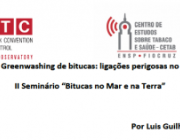
No dia 03 de dezembro acontece o 2º seminário “Bitucas no Mar e na Terra”, anunciado com a presença de pesquisadores nacionais e internacionais. O evento é organizado pelo coletivo Mundo SEM Bitucas (MSB) e é liderado pela mestranda Natália Zafra Goettlicher (FSP-USP), do Grupo de Pesquisas Avançadas em Inteligência Artificial no Setor Agroflorestal (LINEAR), da Unesp. O grupo também conta com integrantes do Laboratório de Oceanografia e Poluição de Ambientes Aquáticos (Lopaq) e da Universidade Federal Rural de Pernambuco.
HASSELMAN, Luis Guilherme. Greenwashing de bitucas: ligaçoes perigosas no seminário bitucas no Mar e na Terra. Cetab/Ensp/Fiocruz, nov. 2021. 3p.
June 5th, 2021, is World Environment Day. According to UNEP, we are the generation that can make peace with nature. As the world struggles with the worse pandemic ever, several discussions around environmental aspects linked to the surge of pandemics have emerged. According to an IPBES report released in October 2020, future pandemics will emerge more often, spread more rapidly, do more damage to the world economy and kill more people than COVID-19 unless there is a transformative change in the global approach to dealing with infectious diseases. The same human activities that drive climate change and biodiversity loss also drive pandemic risk through their impacts on our environment. Changes in the way we use land; the expansion and intensification of agriculture; and unsustainable trade, production and consumption disrupt nature and increase contact between wildlife, livestock, pathogens and people. According to the UN Secretary General, there is a framework for action – the 2030 Agenda for Sustainable Development and the Paris Agreement on Climate Change. A number of reports have followed. A report commissioned by the WHO FCTC Secretariat in 2019, concludes that tobacco’s environmental footprint, together with its negative health, social and economic implications, make it incompatible with the global sustainable development agenda, in particular SDGs 12 – responsible consumption and production, 13 – climate action, 14 – life under water, and 15 life on land. The report also describes several ways tobacco harms the environment: global cultivation of tobacco requires substantial land use, water consumption, pesticides and labour – all finite resources that could be put to better use. Harmful impacts include deforestation leading to climate change; water and soil depletion; human toxicity; ecosystem eutrophication; and acidification. Processing, the curing of tobacco leaves to produce dry tobacco, is highly energy intensive with use of coal or wood contributing to greenhouse gas emission and deforestation. Additional inputs and waste production occur with the transport and manufacture of cigarettes as well as their final use and disposal. Cigarette buts and the ENDS/HTPs batteries and devices are additional examples that show how the environment can be devastated by a product that roughly kills one in every two consumers. A product that is totally unnecessary to human beings. A product that is produced by an industry that uses child labor to make their profits, misleads the public with new generation products as a cessation panacea that keeps their consumers addicted to nicotine while enticing young generations, buys science and lobbies policy makers, decision makers and legislators. And, at the same time promotes itself as a supporter to human rights and the environment. Finally, in a world facing enormous pressures on natural resources, tobacco competes with valuable commodities that are essential for humanity and adds significant pressures on the health of our planet and its most vulnerable inhabitants. In the name of the present and future generations, we must do something about it. The WHO Framework Convention on Tobacco Control (FCTC) addresses the environmental concerns regarding tobacco in Article 18, which states that: “In carrying out their obligations under this Convention, the Parties agree to have due regard to the protection of the environment and the health of persons in relation to the environment in respect to tobacco cultivation and manufacture within their respective territories.” According to an article published by Thomas Novotny & al, our interviewee of today, the environmental lifecycle of tobacco can be roughly divided into four stages: (i) tobacco growing and curing; (ii) product manufacturing and distribution; (iii) product consumption; and (iv) post-consumption waste. Thomas Novotny is the invitee from CETAB/FIOCRUZ and CICCGT in commemoration of World Environment Day, 5th June 2021. He is well known in the global public health community for his research in the tobacco control field. Dr Novotny has studied extensively the environmental impact of the tobacco value chain and will share with us some insights about the topic.